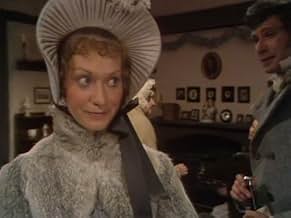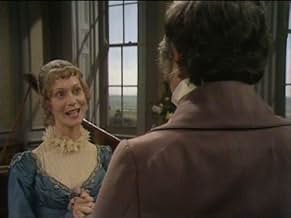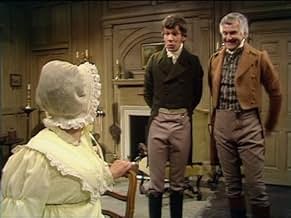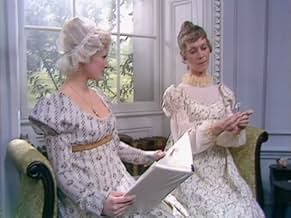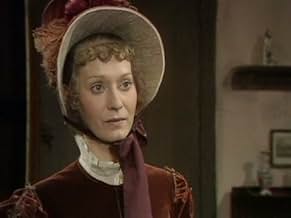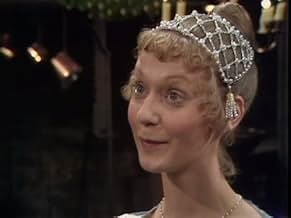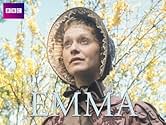Füge eine Handlung in deiner Sprache hinzuWhile matchmaking for friends and neighbours, a young 19th Century Englishwoman nearly misses her own chance at love.While matchmaking for friends and neighbours, a young 19th Century Englishwoman nearly misses her own chance at love.While matchmaking for friends and neighbours, a young 19th Century Englishwoman nearly misses her own chance at love.
Folgen durchsuchen
Empfohlene Bewertungen
The appealing nature of this adaptation is its length and its fun. Characterisaton comes close to the work Davies did in 1996 for A&E, although it differs somewhat. That might be down to the literary criticism of the day, though, and particularly in the judgment upon Harriet as a dull, stupid cow. Davies was a little more nuanced in his judgment upon all characters, but nonetheless, the work Denis Constanduros produced was very true to the spirit of the novel and made use of the comedy elements in the original text. Particularly in costume and the one character of Mr Woodhouse Constanduros produced classic comedy that was about words rather than one-liners and ridiculous situations.
Also the age-difference between Emma and her Mr Knightley is very much apparent. Knightley is not as vigorous as Mark Strong in the role, but this Mr Knightley has not the task of radiating sex-appeal, but rather radiating stability and wisdom through experience, like Austen's version.
Despite the lack of technology to make shots and filming on location truly possible, they did well. There is also no music which made it necessary for the actors and director to truly act and film the characters' feelings so the viewer could comprehend them. It is surprising how they managed to still convey the same emotional tension (or even more of it than they do now) through mainly just close-ups. That, though, might slightly bother the modern viewer. However, through it, viewers are compelled to use their own brain more than with modern adaptations of the novel.
Most of the contents is not toned down, only maybe the complicated business with Churchill and Jane when things are going wrong in the end. The main point of Emma and Knightley's blindness to each other stays upward better than in the Miramax version of 1996. And that without all that Miramx had to their disposal.
It is the only adaptation of the work as well, that uses the wordiness of Austen. It is important as a viewer that one listens more than that one watches. We could easily just make the adaptation in a hear-play, it would make little difference. The language is so expressive and the comedy is so much embedded in it that the physical acting matters less. And that is what Austen is about: it is no slapstick, but pure wordy wit. We have come a long way since the 1970s in comedy.
All in all, a satisfactory adaptation without sex-appeal, but with sweetness. I daresay, how Austen would have liked it.
Also the age-difference between Emma and her Mr Knightley is very much apparent. Knightley is not as vigorous as Mark Strong in the role, but this Mr Knightley has not the task of radiating sex-appeal, but rather radiating stability and wisdom through experience, like Austen's version.
Despite the lack of technology to make shots and filming on location truly possible, they did well. There is also no music which made it necessary for the actors and director to truly act and film the characters' feelings so the viewer could comprehend them. It is surprising how they managed to still convey the same emotional tension (or even more of it than they do now) through mainly just close-ups. That, though, might slightly bother the modern viewer. However, through it, viewers are compelled to use their own brain more than with modern adaptations of the novel.
Most of the contents is not toned down, only maybe the complicated business with Churchill and Jane when things are going wrong in the end. The main point of Emma and Knightley's blindness to each other stays upward better than in the Miramax version of 1996. And that without all that Miramx had to their disposal.
It is the only adaptation of the work as well, that uses the wordiness of Austen. It is important as a viewer that one listens more than that one watches. We could easily just make the adaptation in a hear-play, it would make little difference. The language is so expressive and the comedy is so much embedded in it that the physical acting matters less. And that is what Austen is about: it is no slapstick, but pure wordy wit. We have come a long way since the 1970s in comedy.
All in all, a satisfactory adaptation without sex-appeal, but with sweetness. I daresay, how Austen would have liked it.
I have rated this quite highly on two counts - one, the casting (largely forgotten names litter the cast including Doran Godwin as Emma, John Carson as Mr Knightley, Debbie Bowen as Harriet, Constance Chapman as Miss Bates, and Timothy Peters as Mr Elton) and two, an absorbing adaptation even if done in obviously studio (and rather cheap) sets.
Running at four hours plus, this version does more justice to the book than more cursory and recent attempts have been able to. Although both Emma and Knightley come across as a little older than they should be (21 and 39 I believe in the book), their growing understanding is believable, and you do find yourself hoping for that elusive happy ending.
What does mark it down is the annoying tune! Quick bit of trivia: Blackadder fans should note that Robert East, Prince Harry in the first series, is here as Frank Churchill.
Running at four hours plus, this version does more justice to the book than more cursory and recent attempts have been able to. Although both Emma and Knightley come across as a little older than they should be (21 and 39 I believe in the book), their growing understanding is believable, and you do find yourself hoping for that elusive happy ending.
What does mark it down is the annoying tune! Quick bit of trivia: Blackadder fans should note that Robert East, Prince Harry in the first series, is here as Frank Churchill.
I haven't seen Kate Beckinsale's version in a while, but I do have fond memories of that and shall re-visit it soon. I did enjoy the Gwyneth Paltrow film though that's probably the least effective adaptation-wise, and while the 2009 series with Romola Garai had one or two scenes that didn't work I loved that one too. But I consider this Emma the best version. I too would've liked a few more outdoor scenes to have more of a glimpse of the outside world, and Debbie Bowen does play Harriet a little too broadly. However, it looks beautiful, the interiors more than made up for the lack of outdoor scenes and the scenery and costumes are likewise sumptuous with the photography not too stiff. The writing is thoughtful and witty, and the story is leisurely and gently told in a deliberate way and in spirit and in most details it is true to Jane Austen. Doran Godwin may be too old for the titular character, but what mattered more to me was how she interpreted the role, and I think she did a very good job with Austen's most multifaceted character. John Carson is the same as Knightley, but still turns in a likable performance. Mr Woodhouse is very funny and splendidly played by Donald Eccles(though I personally think Michael Gambon in the 2009 series was a tad more dimensional), while Ania Marsan, Robert East and Constance Chapman give the best Jane Fairfax, Frank Churchill and Miss Bates I've seen, great performances and their characters are very well developed. Overall, wonderful. 9/10 Bethany Cox
I really enjoyed this version of "Emma" and my pleasure was largely due to the very convincing performance by Doran Goodwin in the central role. She was so much better than Kate Beckinsdale in the ITV version who it seems to me lacked the necessary vivacity and personality to carry the role. This Emma was very expressive, arch and satirical, very much, I Imagine, as Jane Austen must have been herself. And unlike the ITV version, which was abominably miscast (excepting Mark Strong's Mr Knightley), this casting was near perfect.
My only complaint is that too much of the action took place indoors, which made it a little claustrophobic and too much like a stage play. We were not allowed to see the village or any exterior shots of Miss Bates dwelling, just room doors opening and closing. The only time we saw anyone in a carriage was during the trip to Box Hill and that was all too brief.
But the indoor scenes were magnificent and authentic looking, too good I'm sure to be just studio sets; they must all have been filmed on location, perhaps in the very large house pictured in the opening shots.
My only complaint is that too much of the action took place indoors, which made it a little claustrophobic and too much like a stage play. We were not allowed to see the village or any exterior shots of Miss Bates dwelling, just room doors opening and closing. The only time we saw anyone in a carriage was during the trip to Box Hill and that was all too brief.
But the indoor scenes were magnificent and authentic looking, too good I'm sure to be just studio sets; they must all have been filmed on location, perhaps in the very large house pictured in the opening shots.
This old BBC serial from the 70s is a slow ramble through one of Jane Austen's great novels. Like all slow rambles there are lots of incidental delights on the way. Time is given for the development of character and the unravelling of the plot. The later film with Gwyneth Paltrow is faster but shallower. This is plainly filmed and there is none of the gorgeous lighting effects that decorate the Paltrow film. Some of it is shot outdoors, notably the Box Hill scene, but it is mainly unfussy interiors.
Doran Godwin's performance as Emma is fine. She brings out the contradictions and weaknesses in her character as well as her many strengths. Jane Austen wanted a heroine that no one would like but herself, then proceeded to create a fully rounded character who is very likeable. The length of the mini-series enables there to be many scenes between Emma and Harriet and Emma and Mr Knightly that illustrate all their characters well. Debbie Bowen and John Carson give excellent support.The rest of the cast of British actors are good. Constance Chapman as Miss Bates is touching and Fiona Walker rips into the part of Mrs Elton with great relish. Donald Eccles is perfectly tiring as Mr Woodhouse.
There seem to be two ways to film Jane Austen. The slower but more complete version like this film and 'Sense and Sensibility' (1971) or the modern upbeat shorter film like 'Emma' (1996) or 'Mansfield Park' (1999). Perhaps only the BBC's 1995 mini series of 'Pride and Prejudice' created the perfect fusion.
This 'Emma' is well worth seeing. If you adjust yourself to the gentle pace there is plenty to enjoy
Doran Godwin's performance as Emma is fine. She brings out the contradictions and weaknesses in her character as well as her many strengths. Jane Austen wanted a heroine that no one would like but herself, then proceeded to create a fully rounded character who is very likeable. The length of the mini-series enables there to be many scenes between Emma and Harriet and Emma and Mr Knightly that illustrate all their characters well. Debbie Bowen and John Carson give excellent support.The rest of the cast of British actors are good. Constance Chapman as Miss Bates is touching and Fiona Walker rips into the part of Mrs Elton with great relish. Donald Eccles is perfectly tiring as Mr Woodhouse.
There seem to be two ways to film Jane Austen. The slower but more complete version like this film and 'Sense and Sensibility' (1971) or the modern upbeat shorter film like 'Emma' (1996) or 'Mansfield Park' (1999). Perhaps only the BBC's 1995 mini series of 'Pride and Prejudice' created the perfect fusion.
This 'Emma' is well worth seeing. If you adjust yourself to the gentle pace there is plenty to enjoy
Wusstest du schon
- WissenswertesThe actors playing husband and wife John and Isabella Knightley(Yves Tighe and Belinda Tighe)are brother and sister in real life.
- PatzerThe characters are seen playing cards with a modern deck of cards that show both the suit symbol (hearts, clubs, spades, clubs) and a number on each corner. During the time period the movie was set in, playing cards did not show the number of the card in the corners.
- VerbindungenFeatured in Funny Women: Mollie Sugden (1999)
- SoundtracksThe Twenty-ninth of May
Traditional
From John Playford's 'The English Dancing Master', First Edition (1651)
[theme]
Top-Auswahl
Melde dich zum Bewerten an und greife auf die Watchlist für personalisierte Empfehlungen zu.
- How many seasons does Emma have?Powered by Alexa
Details
- Erscheinungsdatum
- Herkunftsland
- Sprache
- Auch bekannt als
- Эмма
- Drehorte
- Uppark House, South Harting, West Sussex, England, Vereinigtes Königreich(Exteriors of Hartfield, Emma's home)
- Produktionsfirma
- Weitere beteiligte Unternehmen bei IMDbPro anzeigen
Zu dieser Seite beitragen
Bearbeitung vorschlagen oder fehlenden Inhalt hinzufügen

